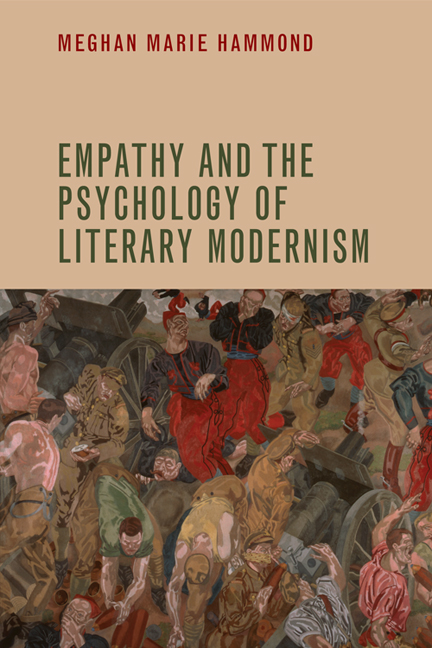Book contents
- Frontmatter
- Contents
- Acknowledgements
- Abbreviations
- Introduction: The Problem of Other Minds and the Fin de Siècle World
- 1 Into Other Minds: William and Henry James
- 2 Dorothy Richardson's Modernist Innovation
- 3 Communities of Feeling in Katherine Mansfield's Fiction
- 4 Empathy and Violence in the Works of Ford Madox Ford
- 5 Virginia Woolf and the Limits of Empathy
- Coda: New Structures of Fellow Feeling
- Bibliography
- Index
Introduction: The Problem of Other Minds and the Fin de Siècle World
Published online by Cambridge University Press: 05 August 2016
- Frontmatter
- Contents
- Acknowledgements
- Abbreviations
- Introduction: The Problem of Other Minds and the Fin de Siècle World
- 1 Into Other Minds: William and Henry James
- 2 Dorothy Richardson's Modernist Innovation
- 3 Communities of Feeling in Katherine Mansfield's Fiction
- 4 Empathy and Violence in the Works of Ford Madox Ford
- 5 Virginia Woolf and the Limits of Empathy
- Coda: New Structures of Fellow Feeling
- Bibliography
- Index
Summary
This book is about empathy and modernism. More specifically, it seeks to map a complicated network of empathic desires and processes in the modernist era. Empathy describes a process of ‘feeling into’, of exploring unknown depths; I have found over the past few years that as a subject of enquiry, empathy has a seemingly inexhaustible number of nooks and crannies that invite exploration. It is a complex and slippery concept that, let loose in the rocky terrain of literary modernism, is difficult to contain or even to grasp momentarily. Yet the more I examine this topic, the more I am convinced that empathy's role in modernism is of profound importance. What follows is my attempt to uncover the ways in which modernist narrative reflects, complicates and enriches contemporaneous conceptions of empathy.
I'm sure many readers will be curious to know, upon seeing the title of this book, why I write about empathy rather than sympathy. For those of us who study the early twentieth century, this particular word choice is a difficult one. The term ‘empathy’, coined by the psychologist Edward Bradford Titchener in 1909, came into the world at roughly the same time as literary modernism. Yet it was not used in literary studies until the 1920s and does not appear to have been in common use until after World War II. ‘Empathy’, in fact, is not a word that my primary literary figures – Henry James, Dorothy Richardson, Katherine Mansfield, Ford Madox Ford and Virginia Woolf – were likely to use. They did, on the other hand, frequently use ‘sympathy’ and related phrases like ‘sympathetic imagination’, ‘sympathetic understanding’, and Woolf's evocative ‘sympathetic vibration’. Nevertheless, ‘empathy’ is the better word for my purposes because I am looking at a particular strain of modernism that is marked by a turn away from sympathetic representation – not a total rupture, but a significant turn nevertheless. This modernist turn in literature follows the first flourishing of modern psychology.
Any study on literary modernism must start by defining its parameters within that broad, ever-growing field. We are by now used to saying that we deal not with modernism, but rather with modernisms.
- Type
- Chapter
- Information
- Empathy and the Psychology of Literary Modernism , pp. 1 - 31Publisher: Edinburgh University PressPrint publication year: 2014



